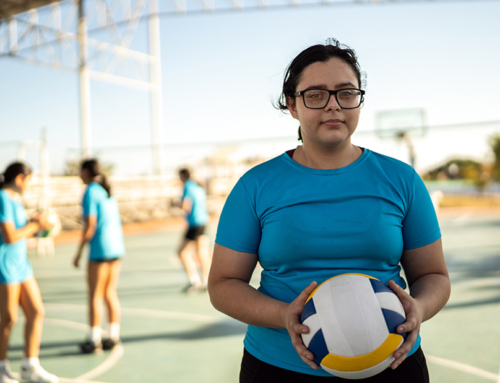Youth fitness programs are an excellent way to keep your child active. But the benefits of training extend far beyond the body.
Weight training is a very powerful medium to develop a child’s mentality. Some may ask: How will big biceps, strong legs and a fast mile time help your kids with school? With their behavior? Their quality of life?
Is weight training just another outlet to run them down and keep them under control?
Learning to lift weights responsibly is the perfect place to develop self-confidence, discipline, goal-setting and resilience. Let’s dive into each of those traits a little deeper to uncover why weight training can build way more than muscle in young people.
1. Fitness Builds Confidence
Confidence is defined as “a feeling of self-assurance arising from one’s appreciation of one’s own abilities or qualities.”
My guess is that the first thing that came to your mind after reading that working out can lead to improved confidence had something to do with the reflection in the mirror. The aesthetics of a fit body are part of the driving force behind the $532 billion cosmetic industry, the $66 billion weight loss industry and the $278 billion health supplement industry.
When it comes to youngsters, however, lifting weights is about learning how to move and building strength.
To equate certain physiques to positive character traits and healthy habits is a bit of a rocky road and not something you necessarily want to fill your kid’s head with right away (re: body dysmorphia disorder).
The true value of developing our bodies is the appreciation for the incredible things it allows us to do. The significance lies in witnessing growth and seeing hard work turn into results. This all sets you up for a better relationship with your body!
The beauty of weight lifting is that there is some immediate feedback, especially for those new to training. You feel the differences you’re making. I feel stronger. I feel a muscle working. I’m getting faster. Et cetera. In terms of measuring progress, you witness improvements in your strength when you’re able to do something you did last time, but heavier, faster or for more repetitions.
A confident kid is an empowered kid. The power of confidence has been widely touted, both academically and athletically. The more confident a kid is, the more likely they are to do well in school, sports and life.
2. Weight Training Creates Discipline
Many definitions exist for discipline, including “control gained by enforcing obedience or order” or “(an) orderly or prescribed conduct or pattern of behavior.”
Discipline has been sold to me a thousand times as the ability to resist doing what it is we know we should not do.
In his book The One Thing, author Gary Keller argues that “success is actually a short race—a sprint fueled by discipline only long enough for habit to kick in and take over.”
The “short sprint” to habit is actually about 66 days on average!
Sixty-six days is no short sprint, especially in fitness, where the No. 1 excuse for not reaching our goals is usually time. Discipline is the ability to see past the shortcuts, the easy-way-outs and the “good enough” moments. It is a skill that requires a committed effort to learning and reinforcing. The great thing about working with kids is that they are at such an impressionable age that there’s a lot fewer bad habits that need to be broken in order to create new, better ones.
Lifting weights and staying active work well as mediums for developing discipline.
This is for much the same reason that it develops confidence: If you repeatedly put in the work, you’ll see results and feel empowered. If you don’t, you won’t. Pretty simple.
Once the importance of staying fit is established, it’s up to kids to commit to getting their work done. It’s up to the parents and coaches to hold them accountable and reinforce the healthy habit. They’ll have to see past the sugary drinks and TV show binges and remember the sense of accomplishment they feel after each training session.
It’s that delayed gratification that gets your child thinking about the work it takes to make something great versus acting on impulse and grabbing whatever’s in front of them for temporary pleasure. Being able to delay gratification for something larger is a huge predictor for success later in life.
3. It Gets Them Setting Goals
A goal is the object of a person’s ambition or effort; an aim or desire result.
Writing, verbalizing and sharing goals are the habits of the most successful people in the world. It doesn’t matter how talented, motivated or educated you are, without goals, you are a train without tracks.
The number of measurable variables in training make it a great way to introduce kids to setting goals. 20 straight Push-Ups? 100 unbroken jump ropes? An 8-minute mile?
These are all goals that are easily visualized and simple to measure. With good coaching and a committed effort, kids can get a taste of the thrill that comes with setting and achieving goals.
This all sets the foundation for kids to understand how to plan ahead and break big-picture visions into smaller actionable steps. Early successes with achieving fitness goals can set the ground work for getting kids to fall in love with the pursuit of goals in other parts of their life, like school or work.
4. They Learn How to Fail
“There is only one thing that makes a dream impossible to achieve: the fear of failure.” -Paulo Coelho
Failure is one of the most valuable resources for those pursuing a goal.
You need two things to get better at anything: practice and feedback. Failure is a big part of that feedback.
Those who can learn from their mistakes are the ones who make the fastest progress. Kids stand to benefit most from early exposure to experiencing failure and managing their mistakes.
However, in today’s social climate of perfectionism and fitting in, it gets more difficult for people to feel comfortable trying new things. Training is a perfect setting for kids to learn how to fail forward and use the feedback they’re getting to improve rather than crumble. Doing so in a group setting is even more empowering.
Failing in front of others is a big step in being vulnerable and normalizing putting forth effort without the fear of judgment.
Upset about losing a competition? A race? Ask what held you back or what you need to improve on, and set up a plan to meet the mark. A good training program is going to help you discover that your limits are generally a lot further than you might think and will encourage you to work on your weaknesses.
Barbells, dumbbells and med balls, don’t just build muscle and strength. They build character, too. So get out and start training!
Article originally posted on stack.com
READ MORE:



